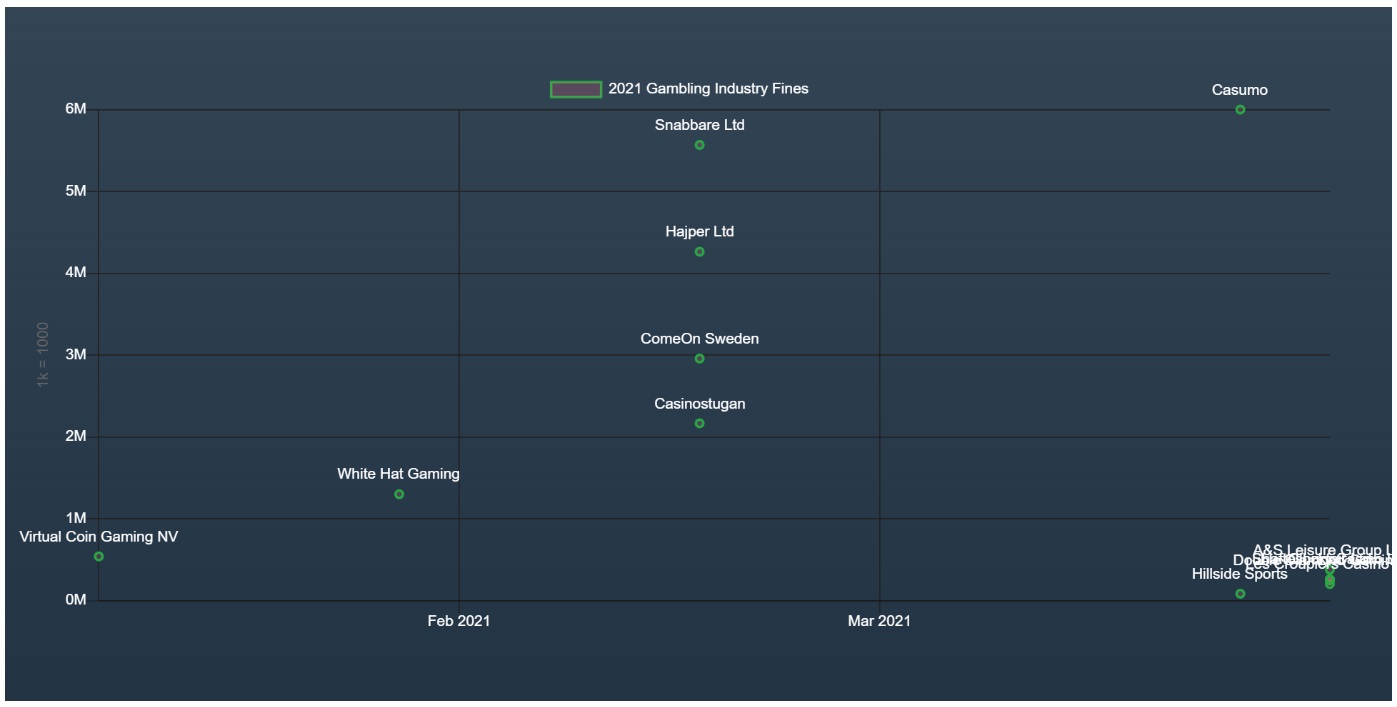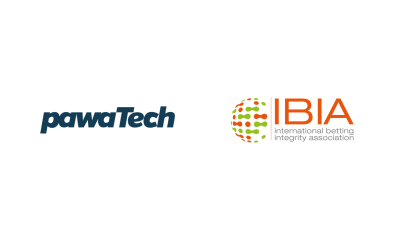Compliance Updates
Regulator-Issued Sanctions to Gambling companies in Q1 2021 Exceed First Half Total of 2020

A New report from gambling compliance tracker website GamblingIndustryfines.com has tracked over £24m / $33m in gaming operator fines for the first quarter of the year.
The report shows that European and UK gambling regulators Issued more fines to gambling companies in the first quarter of 2021 than they levied in the first half of 2020
Between them, the UK Gambling Commission (UKGC), Swedish Gambling Authority (Spelinspektionen) and the Netherlands’ Kansspelautoriteit issued sanctions to thirteen online and land-based gambling operators in Q1 of 2021 – which included financial penalties and warnings.
The largest financial sanctions so far in 2021 came in March when the UKGC fined online casino firm Casumo £6,000,000 ($8.2M) for breaching anti-money laundering rules and failing to ensure that players were gambling responsibly.
Gambling companies hit by regulatory settlements included White Hat Gaming, Virtual Coin Gaming, Hajper Ltd, ComeOn Sweden, Casinostugan, Hillside Sports, Clockfair, Shaftesbury Casino, Les Croupiers Casino, Double Diamond Gaming.
Key failings by gambling companies fined in 2021 included:
- Anti money-laundering failings
- Social responsibility failing
- For Offering Odds on a Match Featuring Underage Players
- Offering bonuses in breach of local gaming laws
- Failure to prevent Overspending & placing limits on accounts
- Operating unlicensed domains
- failing in identifying customers at risk of gambling related harm
- Not having appropriate Anti-Money Laundering (AML) measures.
The increase in fines & gambling-industry regulations worldwide by governments and regulators could make 2021 a record-breaking year for compliance-related gambling industry fines.
To view detailed information for all fines issued to gambling companies in Q1 2020, see the full Q1 2021 report at Gamblingindustryfines.com.
Powered by WPeMatico
Compliance Updates
Romania Bans Celebrities from Gambling Ads

Celebrities will no longer be able to appear in gambling ads on TV, radio and online, following a decision voted on Wednesday in a public meeting of the National Audiovisual Council of Romania (CAN). The provision is part of a series of amendments that passed the Code of Broadcasting Regulation, the NAC’s secondary legislation.
“It is forbidden to broadcast advertising for gambling featuring public, cultural, scientific, sports or other personalities who, due to their online notoriety, may encourage participation in such games,” says the new Article 110, paragraph 7 of the newly voted Audiovisual Code.
The new provision will become mandatory in a few months, more precisely 90 days after the Audiovisual Code enters into force.
Several amendments were submitted by institutions or gambling companies in an attempt to stop this provision.
Among the challengers were Winbet, which asked the CNA to allow stars to be used at least in “social responsibility” campaigns. So did the Romanian Football Federation, which proposed that personalities should be allowed to appear in awareness or social responsibility campaigns.
Kaizergaming, the Federation of Gambling Organisers and the Romanian Bureau of Transmedia Audit asked for the deletion of the article.
All amendments were unanimously rejected.
The post Romania Bans Celebrities from Gambling Ads appeared first on European Gaming Industry News.
AGCO
AGCO Fines Great Canadian Casino Resort Toronto $350,000 for Serious Regulatory Violations Linked to Impromptu After-Party on Gaming Floor

The Alcohol and Gaming Commission of Ontario (AGCO) has issued monetary penalties totaling $350,000 against Great Canadian Casino Resort Toronto for multiple violations of provincial gaming standards. The penalties follow an impromptu after-party that was permitted to take place in the pre-dawn hours directly on the casino’s gaming floor.
On September 27, 2024, an electronic dance music event attended by thousands of people was hosted in the theatre adjacent to the casino at Great Canadian Casino Resort Toronto. The event was marked by widespread intoxication, disorderly behavior, and numerous criminal and medical incidents – both inside and outside the venue – including alleged assaults, drug overdoses, and acts of public indecency. Although paid duty officers were present, additional police and emergency services were required to manage the situation.
In the midst of this high-risk environment, casino management approved an unscheduled request by the performing artist to host an after-party on the active gaming floor. The artist and more than 400 guests were permitted onto the gaming floor where the artist was allowed to perform amidst operational table games and gaming machines – without any prior risk assessment or planning.
As a result, security personnel were unable to effectively control the casino floor, including witness reports that an attendee was seen climbing onto slot machines. Failure to maintain appropriate control compromises the security, safety, and integrity of the casino floor. Following the conclusion of the event, the operator failed to promptly report these incidents to the AGCO as required.
Based on the findings of its review, the AGCO’s Registrar has issued an Order of Monetary Penalty (OMP) totaling $350,000 against Great Canadian Casino Resort Toronto. These penalties address critical failures in their operations, incident reporting, employee training, and the management of disturbances.
A gaming operator served with an OMP has 15 days to appeal the Registrar’s decision to the Licence Appeal Tribunal (LAT), an adjudicative tribunal that is part of Tribunals Ontario and independent of the AGCO.
“Casino operators have a fundamental duty to control their gaming environment. Great Canadian Casino Resort Toronto’s lapses in this incident compromised the safety of patrons and the security and integrity of the gaming floor,” Dr. Karin Schnarr, Chief Executive Officer and Registrar of AGCO, said.
The post AGCO Fines Great Canadian Casino Resort Toronto $350,000 for Serious Regulatory Violations Linked to Impromptu After-Party on Gaming Floor appeared first on Gaming and Gambling Industry in the Americas.
Brazil
Esportes da Sorte holds forum on “Integrity in Sports” with Ceará and Náutico

Esportes da Sorte hosted its Match-Fixing Prevention Forum last week at Ceará and Náutico as main sponsor of both clubs. Held in partnership with Sportradar, the initiative is part of a series of in-person workshops, with upcoming sessions planned for Corinthians and Ferroviária.
The project aims to combat illegal practices and reinforce a strong commitment to integrity in sport. Activities were tailored for athletes and members of the technical staff from the men’s and women’s professional teams, as well as the under-20 squads. During the sessions, topics such as the definition of match-fixing, types of fraud, fraudsters’ modus operandi, legal risks, and reputational impacts were covered. Participants were offered practical guidance on how to respond to suspicious approaches.
“This training programme reinforces our commitment to sports integrity and responsible gaming, pillars that guide our actions. We believe education is the best form of prevention, and we want to stand alongside clubs in this joint effort for transparency and the protection of sport,” said Ana Carolina Luna Maçães, Compliance Manager at Esportes Gaming Brasil, the group behind the Esportes da Sorte brand.
“Ceará takes this topic very seriously. The club is an important player in the fight against match-fixing. We act preventively with regular meetings and have a handbook that addresses the topic with our squad. It is our duty to provide these moments of learning for athletes and technical staff. We live in a time when the integrity of sport is being questioned. In this scenario, actions like this are extremely important,” commented Lucas Drubscky, Football Executive at Ceará.
The sessions were led by Felippe Marchetti, Integrity Partnerships Manager at Sportradar, a global sports technology company and recognized authority in sports integrity. In Brazil, Sportradar partners with the Brazilian Football Confederation (CBF) and 17 state federations, monitoring more than 10,000 matches per season. The company recently signed a Technical Cooperation Agreement (TCA) with the Ministry of Finance and the Ministry of Sports.
“Raising awareness among athletes and teams is one of the most effective ways to protect competitions from manipulation. These workshops are designed to equip participants with the knowledge and tools to recognize threats and act responsibly. We are proud to support initiatives like this that strengthen the integrity of Brazilian sports,” said Felippe Marchetti.
The post Esportes da Sorte holds forum on “Integrity in Sports” with Ceará and Náutico appeared first on Gaming and Gambling Industry in the Americas.
-

 Latest News7 days ago
Latest News7 days agoThe Most Popular Gaming Platforms in Germany: Console and Smartphone Attract Ever More Video Game Players
-

 Balkans7 days ago
Balkans7 days agoSYNOT Partners with Efbet in Bulgaria
-

 Asia7 days ago
Asia7 days agoFIFA, NBA, UFC and More Sports Events Go Live – Crypto Sportsbook BETY Offers Global Sports Betting Coverage 2025
-

 Australia6 days ago
Australia6 days agoVGCCC: Minors Exposed to Gambling at ALH Venues
-

 EveryMatrix Press Releases7 days ago
EveryMatrix Press Releases7 days agoSlotMatrix unleashes divine riches in Fortuna Gold where gods rule the reels
-

 Brazil7 days ago
Brazil7 days agoTG Lab unveils new Brazil office to further cement position as market’s most localised platform
-

 Africa6 days ago
Africa6 days agopawaTech strengthens its integrity commitment with membership of the International Betting Integrity Association
-

 Baltics7 days ago
Baltics7 days agoEstonian start-up vows to revolutionise iGaming customer support with AI




















